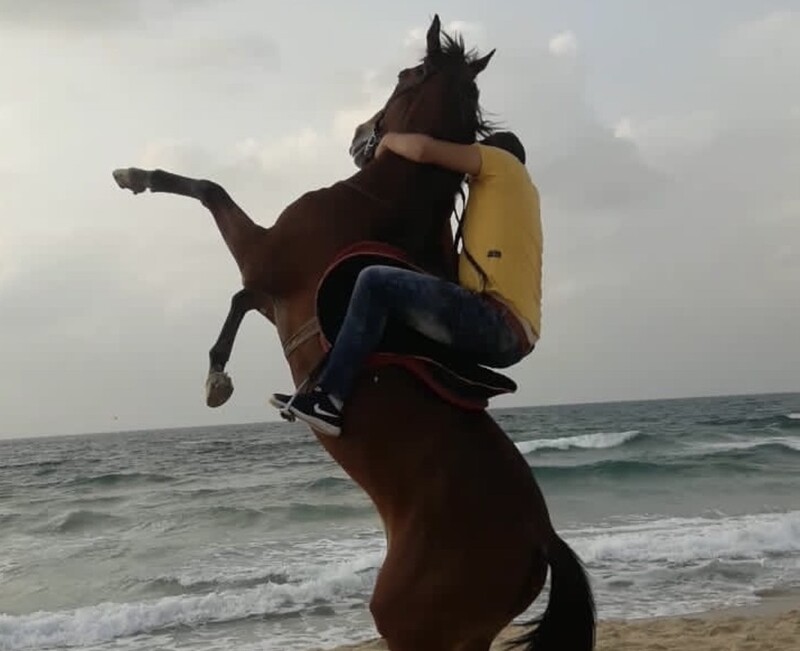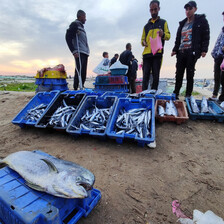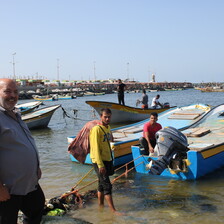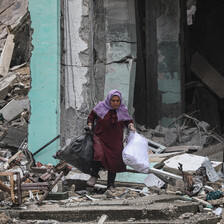The Electronic Intifada 28 August 2024

The author’s father on the beach with his first horse.
In every war, there are stories that are told and there are others that are forgotten.
Some stories may not even seem so important to an outsider who has yet to experience the complete loss of normalcy and the total absence of any kind of security that war – especially genocidal war – brings.
But it is precisely the collapse of all usual standards when you are faced with a daily existential struggle for survival, not just your own, but of everything you hold dear, that also brings out extraordinary courage and love that transcends all boundaries.
On 7 October, we made an early decision to leave our home in the al-Amoudi area in northwest Gaza, not far from the boundary with Israel. Right from the beginning it was clear that our area would not be safe, so we moved to my grandfather’s house in the al-Daraj area of Gaza City, the old part of town.
Our home was the center of our family life. The family factory – where we make sheets, pillows and blankets from imported fabric – was right next to the house by our orchard, filled with olive, lemon and orange trees. And next to these, my father, Abdul Karim – a lifelong lover of animals – kept a purebred he called Shurouq.
Horses had been his passion throughout life. They brought him closer to his late mother, Reda, who had given him his very first horse, Khuloud, as a present at 18 when she knew she was dying. He would groom Shurouq, braid her hair and ride her along the beach at any opportunity and whenever he felt stressed.
It was out of the question for my father to bring Shurouq when we evacuated our home. At least, that’s what we thought. It was with deep regret that he left Shurouq at home.
And it was with great worry that we woke up on the morning of 8 October to find my father missing. We searched for him everywhere. He was nowhere to be seen until two hours later, when he came back … with Shurouq in tow.
He hadn’t told us. He said he didn’t want to tell us because he knew we wouldn’t have allowed him to go get her.
Loss
Israel’s genocidal violence kept getting worse. After four months, during which we endured the most appalling conditions — continuous, indiscriminate bombings, endless massacres, and near famine with us all surviving on just half a loaf of bread every two days — we had to make a decision.
My married brother Aaed wanted to go south, somewhere with a little more food available for his wife and two young children.
We all agreed. Except for my father.
“If you want to go, I won’t stop you, but I won’t go with you.”
Why, I asked him. Simply, he did not want to leave Shurouq. He considered her a fourth daughter. He did not want to take her south, fearing Israel’s soldiers would make a sport of shooting her. And he could not let her stay to her fate.
We could not let him stay to his fate. So we all stayed.
In March, an Israeli shell struck the house behind my grandfather’s house.
I had never seen my father cry before. Not even during this genocide, with all we had lost: the house, the factory, our shops. Not once.
But this time he was crying. He had lost the last thing of his that remained and that reminded him of better times, or normal times. Shurouq was killed in the shelling of the neighbor’s house, which mercifully did not kill anyone else.
And I truly understood for the first time what she had meant to him.
Dawn
My father’s first horse was given to him by his mother, who, at the time, knew she was dying from leukemia. She died a year after gifting him Khuloud and a day after his wedding to my mother, when he was just 19.
I never met my grandmother. I know that, as her only son, my father occupied a special place in her heart. I know that, from a young age, he had to both work and study to care for his family, including his two sisters.
I know, from family lore, that Reda also had a special knack for trading gold, an ability that would help her afford the horse for my father.
My father has never forgotten what his mother gave him. He sees horses as a symbol of his mother’s constant presence.
Khuloud was bit by a snake and the vet had to put her down. My father immediately decided to get Shurouq.
Shurouq was killed by the Israeli military, a military engaged in a genocide in full view of an uncaring world.
But my father will not give up. If – when – this war ends, and if we survive, he will buy another horse.
He already has a name: Fajr. Dawn.
Nada Hamdouna is a writer in Gaza.





